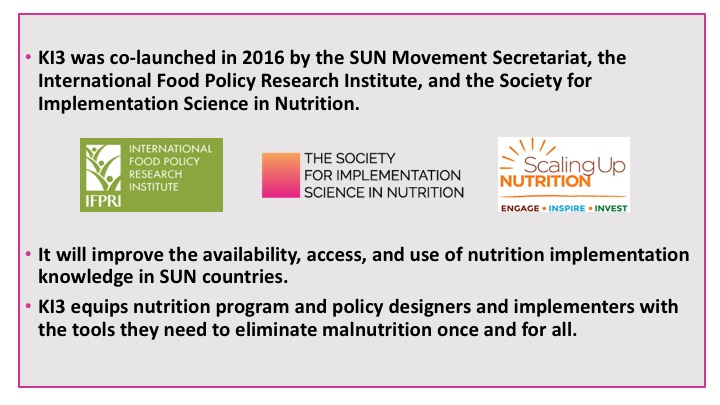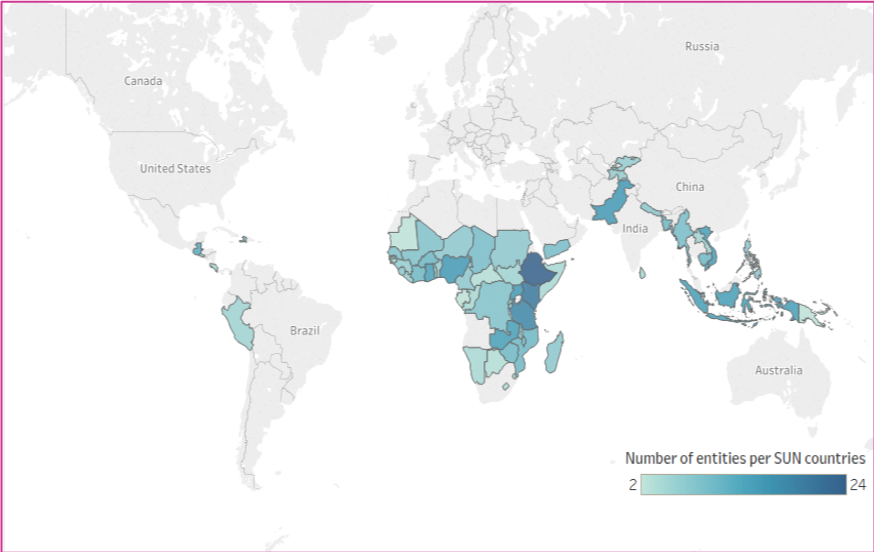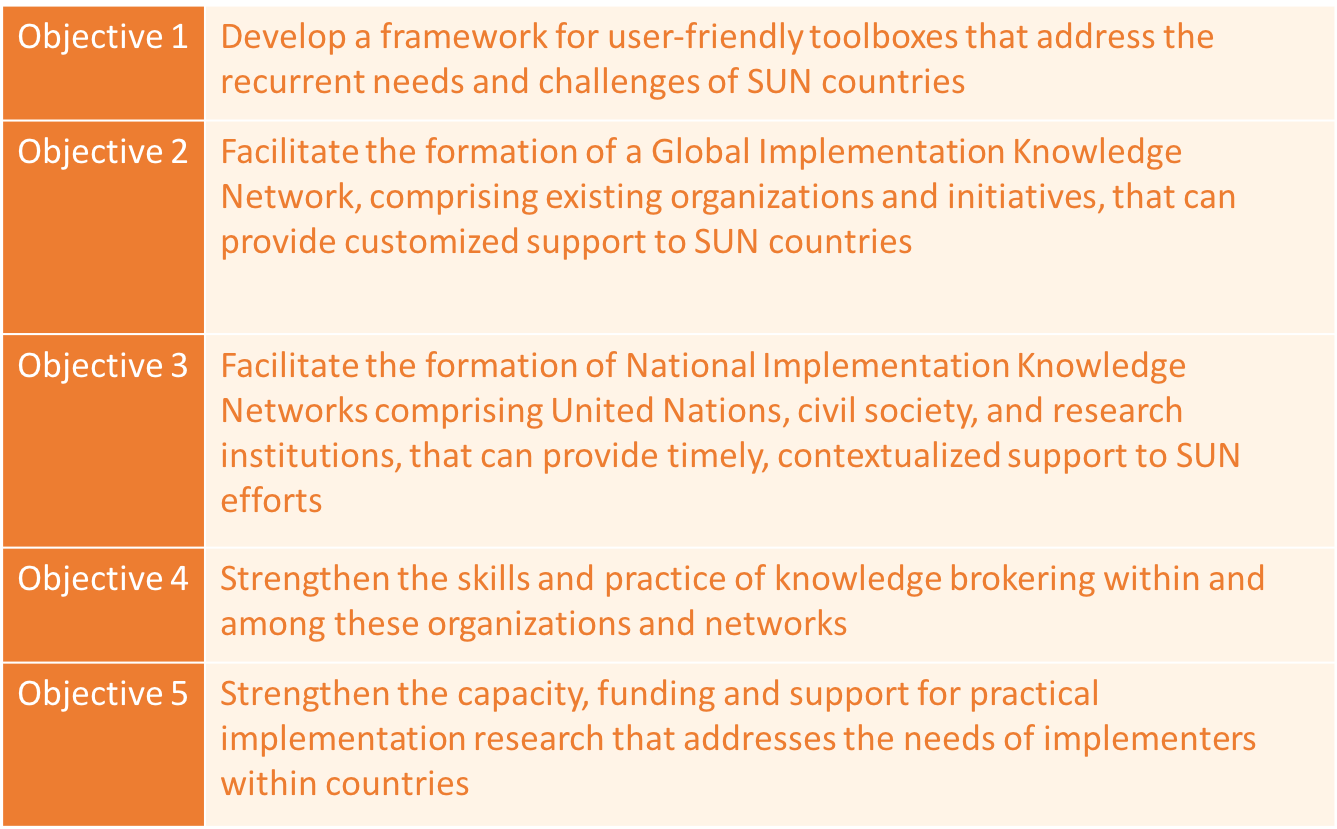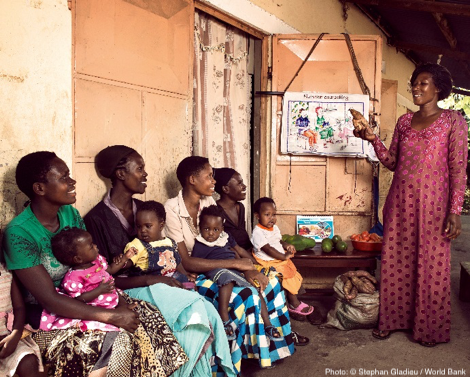Improving Access To and Use of Implementation Knowledge: The Knowledge for Implementation and Impact Initiative (KI3)
We are excited to be partnering with the International Food Policy Research Institute (IFPRI) and the SUN Movement Secretariat on the Knowledge for Implementation and Impact Initiative (KI3). This blog is based on a brochure produced by the Project Team to provide background on the project and an update on progress. Download a PDF version of the brochure here.
Learn more about KI3 during our side event at the IFPRI-FAO Global Event: Accelerating the End of Hunger and Malnutrition in Bangkok, November 28-30, 2018. Read more here.

Why implementation knowledge?
Malnutrition is one of the most critical challenges of our time. 815 million people are undernourished and nearly 1 in 4 children is stunted, or too short for his or her age. In recent years, the global community and countries, especially those belonging to the Scaling Up Nutrition (SUN) movement, have taken up the challenge of addressing malnutrition. As countries seek to implement multisectoral plans and many types of nutrition interventions, there are important gaps in knowledge on how to implement these plans and programs. The Knowledge for Implementation and Impact Initiative (KI3) was launched in 2016 to close these gaps. It seeks to strengthen the availability, access, and use of nutrition implementation knowledge in SUN countries.
Recognizing that a great deal is already known about how nutrition interventions can best be implemented, but that this information may not be readily accessible and used, KI3 researchers’ initial aim has been to assess what type of knowledge already exists. What existing tools, for example, can professionals draw from as they evaluate the quality of their programming? Where can they access technical assistance to build nutrition capacity? What strategies have succeeded in bringing government ministries and partners together to work on nutrition multisectorally? KI3 seeks to make it easier for planners and implementers to answer questions like these. It is also helping to build countries’ capacities to carry out practical implementation research to address remaining knowledge gaps.
What has KI3 already accomplished?
In 2017, KI3 researchers assessed the needs of SUN country stakeholders for different types of knowledge and assistance to implement and scale up nutrition actions. They mapped the organizations and initiatives that already provide these types of knowledge, the first exercise of its kind. They collected feedback at the SUN Global Gathering (Abidjan, Côte d’Ivoire) on how program designers and implementers prefer to access knowledge on multi-sectoral nutrition actions. And they explored collaborations with the SUN Civil Society Network, a key platform for connecting knowledge providers with implementers.
What are some preliminary findings?

One of the findings of KI3’s systematic mapping exercise: SUN countries currently served by knowledge providers
- Researchers identified 49 knowledge-providing organizations and initiatives around the world and proceeded to create a systematic map of their characteristics and services.
- The systematic map showed that despite their impressive breadth of work, knowledge-providing organizations and initiatives are only operational in a small number of SUN countries, and very few have headquarters in SUN countries.
- Despite this plethora of resources, implementers in SUN countries still need assistance and practical, curated, and hands-on implementation knowledge that is specific to their country, accounting for different social, political, and economic realities.
- Collaborating with the Civil Society Network will help build capacity in SUN countries for locally-relevant implementation knowledge. Civil society actors could also be supported by the Technical Assistance Network (TAN), whose member organizations have already been responding to SUN countries’ formal requests for assistance in recent years.
What is on the horizon for KI3?
KI3 will pursue five objectives in 2018-2019, all of which will help it strengthen the availability, access, and use of nutrition implementation knowledge in SUN countries.

We thank the KI3 Project Team for their contribution to this blog. To keep updated with the progress of KI3, check out our activities page here or contact us.
Have an idea or a comment on any of the issues discussed above? We welcome your feedback – you can comment on this post on our LinkedIn feed or write to us at info@implementnutrition.org.

